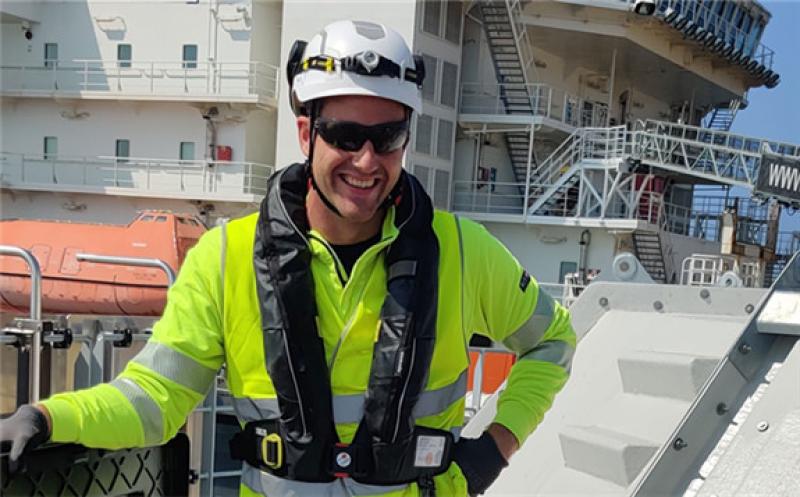After many months of preparation, the installation of the foundations of Dutch offshore wind farm Hollandse Kust Zuid has now started. “It’s a great feeling that all our ideas are now put in practice,” says Malte Röder, Foundation Installation Manager at Vattenfall.

The offshore construction of the Hollandse Kust Zuid wind started in the beginning of July. Over the next two years, the windfarm, which is the world’s first offshore wind farm built without subsidies, will be built off the Dutch coast. The fossil-free energy generated by the wind farm will benefit both households, businesses and industrial partners.
As installation manager, Malte Röder and his team make sure that the foundation installation work is well prepared and executed in a safe manner:
“We always try to identify who’s best suited to perform a certain task and work collaboratively towards the same goal .”
Every couple of days, the installation vessel Seaway Strashnov docks in Rotterdam to pick up sets of foundations and secondary steel components to be installed at sea.
Individually designed foundations
Malte Röder started working on Hollandse Kust Zuid in the summer of 2020.
“We started with the design for the installation tools and methodology, and together with the offshore installation company Seaway 7, we worked towards a suitable concept for the installation of our foundations,” he says.
To guarantee efficient use of materials such as steel, each foundation is designed specifically for the location where it will be installed. The heaviest and largest monopile weighs 955 tons and is 75 metres long, while the lightest and shortest foundation still weighs 735 tons and measures 62 metres. The monopiles will be installed in water depths varying from 17 to 28 metres.
Rough weather conditions
While smaller parts for Hollandse Kust Zuid are stored in and transported from the IJmuiden harbour, the foundations and secondary steel components are shipped from foundation manufacturer Sif’s yard on the Maasvlakte area in the Rotterdam harbour using the installation vessel Seaway Strashnov. The ship has a crane that lifts the monopile foundation into the water and lowers it until it reaches the seabed. Once the foundation is in position on the seabed, a hydraulic impact hammer is used to drive the pile to the final penetration depth.
Malte Röder: “We will install as many foundations as we can until we will take a scheduled break in the fall. Then the weather conditions on the North sea will be too rough to work. During the break we will work to improve and optimize our work procedures even further to ensure that the installation of the remaining monopiles will run as smoothly as possible next year.”
Lessons learned
The first series of foundations and secondary steel components have now been installed and have already provided some valuable lessons for the rest of the installation campaign.
”One of the lessons we took from this first series of installations is that a couple of bolts and nuts did not work quite as they should, “ Malte Röder says. “These kind of practicalities are now popping up because previously we mostly focused on the big parts fitting together. With the construction being far away from shore, you do not just bring new bolts to the construction site. We also have to make sure that other type of bolts have the same lifespan as the rest of the foundation. Plus, everything is so big that you cannot just buy parts in the store.”
“We have also made some improvements already to the preparation of the workplaces. Construction technicians need to have their equipment right next to them, so that they do not need to search for the right tools. It is details like this that you come across when you actually go into construction.”
Overall, Malte Röder is very happy with the progress and the collaboration between Vattenfall, Sif and Seaway 7. “It is great to see all our ideas now put into practice and to work with so many great people who are all very excited about this ground-breaking project.”
Facts about Hollandse Kust Zuid
Owned jointly by Vattenfall and BASF
Total capacity 1,500 MW.
Electricity production corresponds to the annual consumption of over two million Dutch households.
The wind farm will consist of 140 turbines of 11 MW, the biggest ever to be installed at scale.
Rotor diameter: 200 metres
The world’s first subsidy-free offshore windfarm
Full commissioning in 2023.